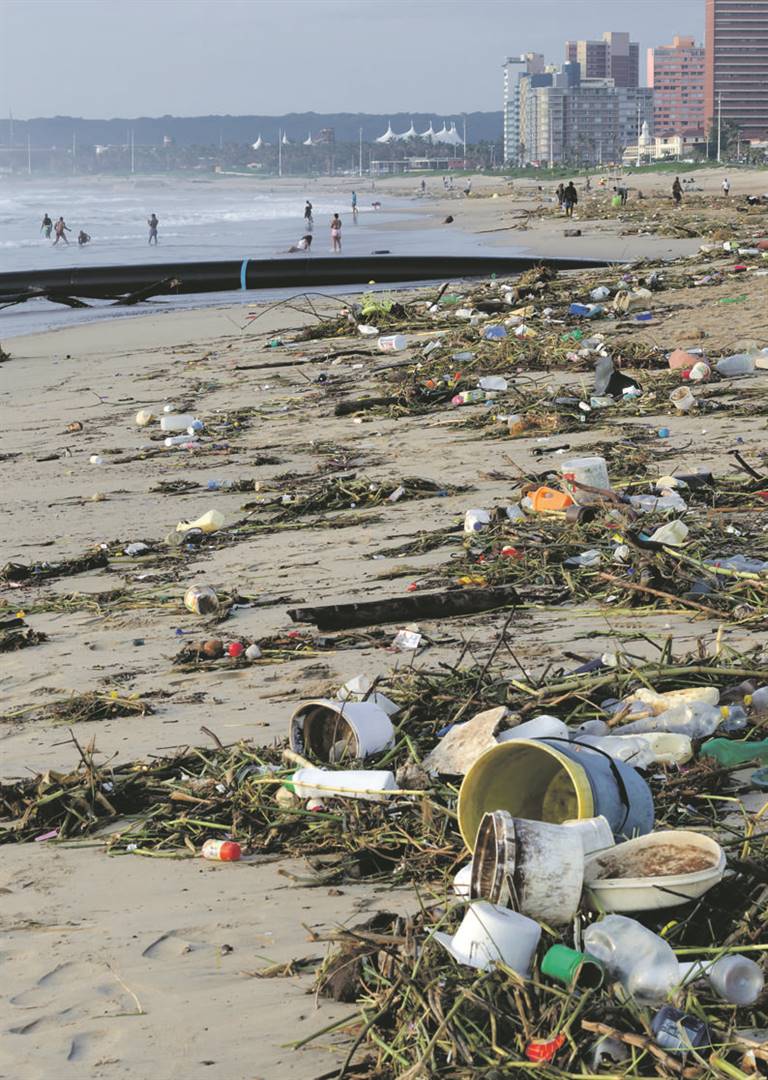
The floods that displaced shack dwellers in KwaZulu-Natal have thrown into stark relief the problem of where to relocate them
Mjwacu Mbongeni doesn’t know what to do about his shack.
It wasn’t swept away by the Palmiet River – as happened to 37 other homes in Quarry Road West, an informal settlement in Durban’s Clare Estate. But it might as well have been.
The wood-and-iron structure stands for the moment, but its southern wall and part of its cement floor now hang in space.
Late last Monday, Mbongeni was awoken by a pungent smell from the river and a growing noise.
He went outside to investigate and realised that it was time to run.
The Palmiet – a tributary of Durban’s principal river, the Umgeni – is usually little more than a stream.
But last Monday, as a cut-off low storm dumped 165mm of rain on the city in 24 hours, it turned from a trickle into a torrent.
By dawn on Tuesday, the row of shacks that stood between Mbongeni’s home and the Palmiet had been swept away or reduced to debris.
The riverbank had shifted and was now beneath his bed.
“Even now, what can I do … the house is not balanced. We are looking for the municipality to help us,” said Mbongeni (33), who hails from Bizana, in the Eastern Cape.
Lungani Lakhene, chairperson of the residents’ committee, was also at a loss for words. “Too many people,” he said, were appealing to him for help.
“They need a place to build their homes. I don’t know what I am going to do … it’s bad.”
Elsewhere in the city, similar scenes of hardship were playing out in the aftermath of the storm. It lashed much of KwaZulu-Natal, especially the coast, with 70 people having lost their lives at the time of publication.
On Friday, Vincent Ngubane, the municipality’s head of disaster management, confirmed that 64 people had lost their lives in eThekwini and more than 1 300 people were being sheltered by the municipality in seven halls and one tent.
The need was greatest in some of the city’s burgeoning informal settlements, where officials have long struggled to get to grips with a hunger for land sharpened by a relentless influx of migrants, many from the Eastern Cape.
Sagar Singh, the DA’s proportional representative councillor for Clare Estate and Reservoir Hills, said 24 informal settlements had mushroomed in the area.
Many were situated on steep slopes or in deep valleys, including public parks, some cheek by jowl with substantial homes in what had been an Indian area under apartheid.
Singh acknowledged that the scale of the problem defied quick fixes, but said it made better financial sense to invest in proper housing than in putting up tents and supplying building materials to shack dwellers after floods and fires.
“When you give them facilities on a riverbed, you are giving them a rope to commit mass suicide. You must apply the by-laws,” he said.
Ward councillor Xolani Nala, also from the DA, expressed concern that the silt and piles of debris that had backed up behind the bridge immediately above the Quarry Road West settlement, would dam the river if it rained hard again, causing more flooding.
Meanwhile, residents busied themselves repairing roofs or wading into the river with spades to recover building materials.
Disaster relief was trickling in too.
A few cars pulled up at the settlement’s entrance. Yoolam Khan, who “lives up the hill”, emerged from one of the vehicles as his friends and family alighted from the others.
They had brought with them two big pots of biryani and lots of kheer (rice pudding).
Singh said a number of donations had already been made from well-wishers.
Food donations were taken into a marquee, erected at the settlement late on Wednesday, on the city’s orders.
About 250 people – a quarter of the settlement’s residents – were sheltering there, said Nala.
A huddle of boys nearby were playing cards for pennies. Why were they not at school? “Uniforms,” was the answer – lost or soaked by the floods.
Lizo Mpongo, whose shack is located near the marquee – and only a few metres above the river – said residents were anxious to rebuild rather than move. He pointed to fresh pegs driven into the ground in front of his home, where shacks will go up.
“They are going to get flooded again,” said Mpongo.
The 31-year-old spoke of how he had lost his first-born son, Simosomzi, to the Palmiet in 2012. The boy had fallen off a pipe over the river where he had been playing, and drowned.
Mpongo said he would not allow his second child to stay with him at Quarry Road West – it was too dangerous.
The six-year-old lives with his mother in Port St Johns, and Mpongo was preparing to travel there to deal with flooding at the family home.
Storms have caused extensive damage in the Eastern Cape town and the SA National Defence Force has been deployed to help with the rescue and evacuation of more than 300 households.
Mpongo said corruption in the allocation of formal housing had driven people to live in shacklands such as Quarry Road West.
But people, he said, were impatient for homes.
“We put ourselves at risk,” he said, adding that residents ignored warnings not to build on the river’s edge.
Still others, he said, had been given RDP homes but preferred to rent these out or start businesses building shacks for rent.
We drove up into Reservoir Hills, to a settlement at Shannon Drive and another at Pridley Park, once a local beauty spot, in a deep valley.
There we learnt that a couple, Nombulelo Mthethwa and Siyabonga Zulu, and their three-year-old child, Lusanda Zulu, had been killed when their house collapsed.
At 2am on Friday, shack-dwellers blocked roads and stoned cars in Reservoir Hills.
According to Lakhene, the protesters – believed to be from Shannon Drive – were angry that they had not received tents, blankets, mattresses and food.
Ngubane said it was not a simple matter to relocate people who had built their homes on flood plains.
“Where is the land to build the homes? And when you move them, new people come. You never win.”
He said the city was doing everything it could to assist people in need and to maintain infrastructure, but pointed out that global warming meant big storms were more frequent.
“You prepare for every eventuality … enough will never be enough,” said Ngubane.




 Publications
Publications
 Partners
Partners










